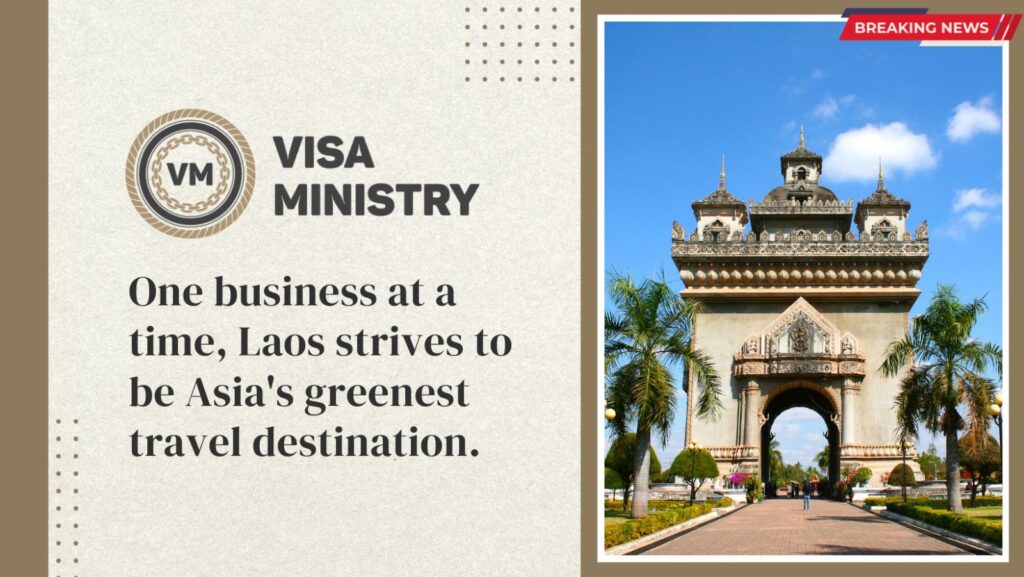Nestled in the center of Southeast Asia, the landlocked nation of Laos is renowned for its verdant scenery, tranquil temples, and a unique way of life that has escaped the fast urbanization that has affected other nations in the area.
However, as the consequences of climate change and the depletion of natural resources were more widely recognized, Laos saw an opportunity to not only protect its distinctive beauty but also to embrace the idea of sustainable tourism. The “Supporting Micro, Small, and Medium Enterprises (MSME) in the Lao Tourism Industry Supply Chain to Access Markets for Sustainable Practices Project” (SUSTOUR Laos) is where this concept came to fruition.
Transforming long-standing customs
The core foundation of SUSTOUR Laos is to promote sustainable consumption and production (SCP) of products and services, and it all begins with the MSMEs at the center of the travel and tourist sector. The tourism industry in Laos depends heavily on these tiny firms, which provide travelers distinctive services and goods. However, it is imperative to make sure that these businesses run sustainably, protecting the environment, conserving natural resources, and acting ethically toward the communities in which they operate. To aid in this process, SUSTOUR Laos was created.
Plan International, the Department of Trade Promotion (MOIC), the Lao National Chamber of Commerce and Industry (LNCCI), and the European Centre for Ecological and Agricultural Tourism (ECEAT) are the main partners in the project, which is supported by the European Union.
The certification of sustainable practices is one of the pillars of SUSTOUR Laos. The Travelife certification criteria will recognize MSMEs that adopt and apply SCP principles. Internationally renowned as the top sustainability certification standard for the travel and tourism sector, Travelife was created by ECEAT. To be certified by Travelife, a business must be a tour operator, travel agent, or lodging (hotels, guest homes).
The Lasting Laos accreditation, meanwhile, is a regional sustainability program for tourism-related supplier companies that have proven sustainable environmental, social, and economic practices. By offering benchmarks and direction for supplier enterprises to measure and improve their sustainability, this program, which is facilitated and managed locally by LNCCI, seeks to increase the overall sustainability of the tourist supply chain. These certifications offer travelers the certainty that they are making ethical and environmentally sound decisions in addition to serving as a badge of merit.
As a green vacation spot, Laos
An objective of SUSTOUR Laos encompasses more than MSMEs. It goes beyond that to include the entire country. This program will lead to an increase in market demand for SCP practices throughout the tourist industry supply chain by positioning Laos as Asia’s greenest travel destination. The desire for ethical and environmentally friendly experiences will increase as more travelers and foreign travel agents learn about Laos’ dedication to sustainability. The tourist industry will be forced to change and adapt as a result of this shift in consumer behavior, which will eventually help the environment, local communities, and the country’s economy.
The benefits are numerous for MSMEs. Adopting sustainable practices enables them to compete more successfully in the global tourism market while also ensuring that they are environmentally responsible. They will distinguish themselves as the ethical option for tourists looking for real, sustainable experiences thanks to the Travelife and Lasting Laos accreditation. The Laotian people benefit from improved income and job opportunities as a result of this competitive advantage.
SUSTOUR Laos is aware that its tourism sector cannot function independently in the quest for sustainability. Local vendors who are equally committed to ethical business conduct must be involved. A thorough and all-encompassing approach to sustainability is fostered by establishing connections between these suppliers and the MSMEs in the supply chain.
Additionally, protecting natural resources is a crucial component of this project. MSMEs will help to improve the environment generally by taking steps like lowering energy use, limiting waste, and protecting water resources. They will work in unison with Laos’ stunning surroundings to preserve the nation’s distinct beauty for future generations.
However, it goes beyond just being environmentally conscious. Equally dedicated to promoting social responsibility is SUSTOUR Laos. MSMEs are urged to engage in local communities in a way that respects their customs, cultures, and general well-being. This strategy not only makes the visitor experience more real, but it also makes sure that the benefits of tourism are fairly distributed among Laotians.
One of the most fascinating aspects of this project as it develops is increasing consumer awareness, particularly among visitors and foreign travel agencies. Laos will be able to draw tourists while simultaneously serving as an example for other places to adopt sustainable tourism practices.
Source- Travel daily
